EPOETIN ALFA - INJECTION
PHONETIC PRONUNCIATION: (e-POE-tin AL-fa)
COMMON BRAND NAME(S): Epogen, Procrit
GENERIC NAME(S): epoetin alfa
Uses
USES: This medication is used to treat anemia (low red blood cell count) in people with long-term serious kidney disease (chronic kidney failure), people receiving zidovudine to treat HIV, and people receiving chemotherapy for some types of cancer (cancer that does not involve the bone marrow or blood cells). It may also be used in anemic patients to reduce the need for blood transfusions before certain planned surgeries that have a high risk of blood loss (usually given with an anticoagulant/"blood thinner" medication such as warfarin to lower the risk of serious blood clots). Epoetin alfa works by signaling the bone marrow to make more red blood cells. This medication is very similar to the natural substance in your body (erythropoietin) that prevents anemia.
How to use EPOETIN ALFA - INJECTION
HOW TO USE: Read the Medication Guide and Patient Information Leaflet provided by your pharmacist before you start using this medication and each time you get a refill. If you have any questions, ask your doctor or pharmacist. This medication is given as an injection under the skin or into a vein as directed by your doctor, usually 1 to 3 times a week. Patients getting this medication before surgery may have a special dosing schedule. Hemodialysis patients should receive this medication by injection into a vein. If you are using this medication at home, learn all preparation and usage instructions from your health care professional. Do not shake this medication. Before using, check this product visually for particles or discoloration. If either is present, do not use the liquid. If you are injecting this medication under the skin, before each dose, clean the injection site with rubbing alcohol. Change the injection site each time to lessen injury under the skin. Learn how to store and discard medical supplies safely. The dosage is based on your medical condition, weight, and response to treatment. Blood tests should be done often to check how well this medication is working and to decide the correct dose for you. Consult your doctor for more details. Use this medication regularly to get the most benefit from it. To help you remember, use it on the same day(s) of the week as directed. Do not increase your dose or use this drug more often or for longer than prescribed. Your condition will not improve any faster, and your risk of side effects will increase. It may take 2 to 6 weeks before your red blood cell count increases. Tell your doctor if your symptoms do not get better or if they get worse.
Side Effects
Precautions
Interactions
Overdose
Images
Reviews
Faq for EPOETIN ALFA - INJECTION
Epoetin alfa injection is used to treat a decrease in red blood cells (anemia) caused by certain medical conditions such as kidney disease, cancer, or chemotherapy.
Epoetin alfa is a man-made version of a natural hormone in the body called erythropoietin. It works by stimulating the bone marrow to produce more red blood cells, thus improving anemia.
Epoetin alfa injection is given as a shot under the skin or into a vein by a healthcare professional. The frequency of administration and dosage will vary depending on the individual and the underlying condition being treated.
Common side effects of Epoetin alfa injection may include headache, nausea, vomiting, joint pain, fever, high blood pressure, and injection site reactions. Serious side effects such as allergic reactions, blood clots, or seizures are rare but possible.
Yes, Epoetin alfa injection can be self-administered at home if instructed by a healthcare professional. However, proper training and guidance are essential to ensure correct usage and prevent any complications.
The response to Epoetin alfa injection varies among individuals, but it usually takes a few weeks to a month before an improvement in red blood cell count and symptoms of anemia are observed.
Epoetin alfa injection should not be used if you have uncontrolled high blood pressure or a history of allergic reactions to Epoetin alfa. It is important to discuss all your medical conditions and medications with your doctor before starting Epoetin alfa treatment.
Epoetin alfa injection should only be used during pregnancy or breastfeeding if the potential benefits outweigh the potential risks. It is important to seek medical advice and discuss the risks and benefits with your doctor.
If you miss a dose of Epoetin alfa injection, contact your healthcare professional for instructions. It is important not to double the dose or make up for a missed dose without medical guidance.
Warning
WARNING: Discuss the risks and benefits of epoetin alfa with your doctor, as this medication may rarely cause very serious (possibly fatal) side effects, including blood clots, heart attack, stroke, or heart failure. It is very important to keep all lab appointments since your doctor will need to carefully check your red blood cell count and hemoglobin level. The lowest effective dose of this medication should be used. When used to treat anemia related to cancer, this medication may also increase the risk of death and/or cause your tumor to grow faster. This medication should be stopped after completing a treatment course of chemotherapy as directed by your doctor.
Disclaimer
IMPORTANT: HOW TO USE THIS INFORMATION: This is a summary and does NOT have all possible information about this product. This information does not assure that this product is safe, effective, or appropriate for you. This information is not individual medical advice and does not substitute for the advice of your health care professional. Always ask your health care professional for complete information about this product and your specific health needs.
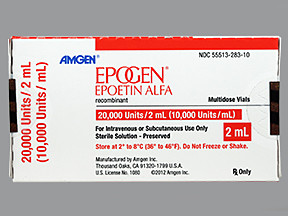

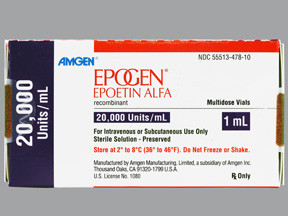
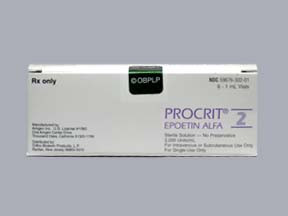
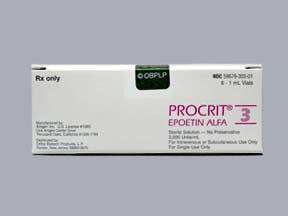
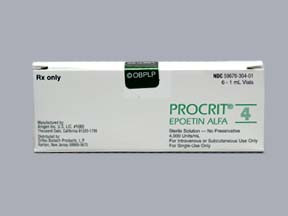
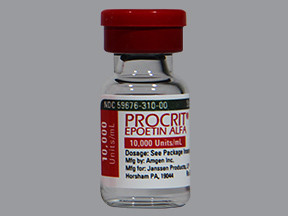
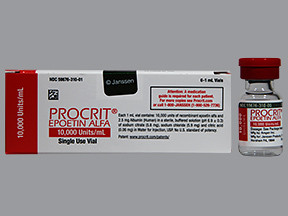
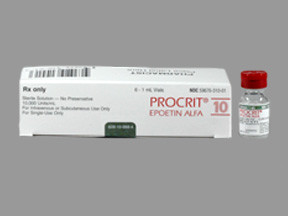
No Reviews Yet